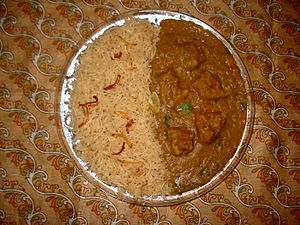Dhansak facts for kids
 |
|
| Type | Rice and Curry |
|---|---|
| Place of origin | India |
| Region or state | Gujarat |
| Main ingredients | Lentils, vegetables, spices, cumin seeds, ginger, garlic, meat (mutton, goat meat), either gourd or pumpkin |
Dhansak is a yummy and popular Indian dish. It comes from the Parsi community in India. The Parsis are followers of a very old religion called Zoroastrianism. Dhansak mixes cooking styles from Persia and Gujarat.
This special dish is made by cooking mutton (lamb) or goat meat. It is mixed with different kinds of lentils and vegetables. Dhansak is usually served with a special kind of rice. This rice is cooked with spices and caramelised onions, giving it a slightly sweet taste.
The idea of mixing meat with lentils and vegetables comes from Persian cooking. This helps to make a smaller amount of meat go further. The name "Dhansak" has two parts. "Dhan" means a cereal dish in Gujarati. "Sak" comes from the Gujarati word "shaak," which means vegetables.
Contents
Why Dhansak is Special
Dhansak is a dish with a lot of history and tradition. It takes a long time to prepare, especially because the lentils and vegetables need to cook until they are very soft. In the past, before pressure cookers were common, people often made Dhansak on Sundays. This was because they had more time to cook it slowly.
Dhansak is also important for certain family traditions. It is often eaten on the fourth day after someone in the family has passed away. For three days before this, people usually do not eat meat. Dhansak is then eaten to mark the end of this period. Because of this special meaning, Dhansak is usually not made for happy events like festivals or weddings.
What Goes into Dhansak
Dhansak is a thick, tasty stew. It is made with cubes of mutton or goat meat. A mix of different lentils and vegetables are cooked together.
Lentils and Vegetables
Traditionally, four types of lentils are used in Dhansak:
Sometimes, cooks might use fewer lentils or swap some out. The vegetables usually include potatoes, tomatoes, brinjal (eggplant), pumpkin, and fenugreek leaves. You can also use other vegetables like squash instead of pumpkin, or sweet potato instead of potato. It really depends on what vegetables are available. After cooking for a long time, the vegetables and lentils blend together. This creates a thick, hearty stew.
The History of Ingredients
The Parsis came to India many centuries ago, around the 8th century CE. They brought their cooking traditions with them, including mixing meat with lentils and vegetables. However, some of the ingredients we use in Dhansak today were not in India back then! For example, tomatoes, chilies, pumpkin, and potatoes originally came from the Americas. They were brought to India by the Portuguese in the 16th century CE. So, the Dhansak recipe has changed and grown over time.
Dhansak Masala: The Secret Spice Mix
The amazing flavor of Dhansak comes from a special spice mix called "dhansak masala." This mix is a bit like "garam masala," but it uses spices that are more sweet and fragrant, not as strong or hot.
Some of the spices in dhansak masala include:
To start the stew, onions and garlic are browned. Fresh coriander leaves, green chilies, and mint leaves are often added at the end for a fresh taste. You can buy dhansak masala ready-made, or some cooks like to make their own mix. This lets them change the spices to their own liking.
Most traditional Parsi Dhansak recipes use goat meat or mutton. It's rare to find it made with other meats like chicken, or without meat at all. Sometimes, international recipes for Dhansak might add pineapple chunks for a sweet taste. But traditional Indian recipes prefer to use pumpkin, squash, or gourd for sweetness.
See also
 In Spanish: Dhansak para niños
In Spanish: Dhansak para niños

